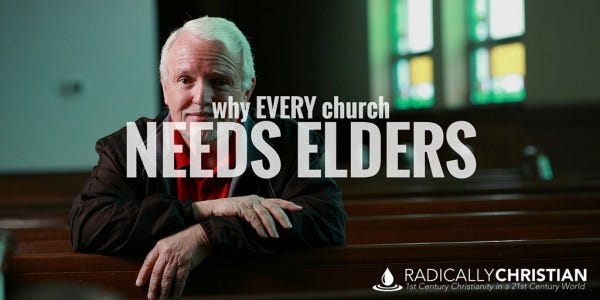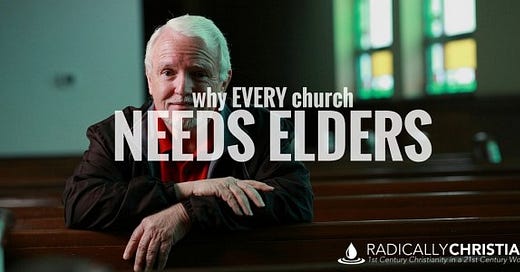Why Every Church Needs Elders
Some words make us very nervous. Among the world’s most nerve-racking words are the simple little words, “all” and “every.” Whenever someone dares use such words, objectors are quick to offer possible exceptions, so as to take the edge off these words. So if someone says, “Every church needs elders,” there are bound to be people who object. That’s why I pray you’ll not object too quickly and you’ll let me explain why every church needs elders.

1. Every Church Needs Elders Because the Bible Says So
On Paul’s first missionary journey, he and Barnabas appointed elders “in every church” (Acts 14:23). This has always amazed me, but it is what the text says. The churches established on Paul’s first missionary journey all had elders when he left them and returned to Antioch.
On the island of Crete, the apostle Paul gave the task of appointing elders to the evangelist Titus. Paul wrote to Titus, “This is why I left you in Crete, so that you might put what remained into order, and appoint elders in every town as I directed you” (Titus 1:5). Every town that had a church, needed to have elders. The way Paul phrases this instruction indicates that every church without elders is an unfinished state and is in need of someone to put things in order.
2. Every Church Needs Elders Because Their Role is Important
Every church not only needs elders, but they need the right kind of elders. Every church needs men who meet the qualifications (Titus 1:5-16; 1 Timothy 3:1-7) and who are willing to do the work. Elders are the shepherds of the flock (Acts 20:28) and as such, they have a very important role:
being teachers of truth (Titus 1:9)
guarding the flock against false teaching (Acts 20:28; Titus 1:9-16)
keeping watch over the souls of the congregation (Hebrews 13:17)
praying with the sick (James 5:14)
being overseers of the affairs of the congregation (1 Timothy 3:1)
3. Every Church Needs Elders Because Every Christian Needs Shepherds
Sheep need shepherds. That is a simple truth, but one that is often overlooked. We tend to think it’s just some sheep who need shepherds. We think sick sheep, new sheep, or not-so-smart sheep need shepherds. But for some reason, some of us think we are so spiritually mature that we really don’t need shepherds.
I need shepherds. You need shepherds. We all need shepherds.
Congregations in the New Testament not only had shepherds, but had a plurality of shepherds, for one reason (I believe) that even a shepherd needs to be shepherded. Elders are not only the congregation’s shepherds, they are each other’s shepherds as well. They mentor each other, hold each other accountable, teach each other, and confess their sins and struggles to each other. At least that’s the way it should be.
Each and every one of us needs to be led. We need people over us. We need accountability. We need to take instruction. We need to obey and submit (Hebrews 13:17). Submission is good for the soul. It humbles us and makes us more like Christ.
4. Every Church Needs Elders Because the Church is Not a Democracy
In the First Century, as well as today, there will almost always be a period of time during a congregation’s infancy when they have no elders. During that time, decisions will inevitably have to be made for the congregation. How should a congregation make decisions during that time? As far as I can tell, Scripture simply doesn’t say; unless, of course, the apostles and evangelists simply told congregations what they should do in every matter until elders could be appointed.
Many congregations resort to men’s meetings or congregational meetings, in which decisions are made democratically. I suppose we think this is biblical because we live in a democracy. And even if this is an acceptable short-term arrangement, I don’t believe it should be seen as a long-term solution. After all, I can’t think of any example of this in Scripture.
The church is not a democracy. It is a monarchy. Christ is the head and there are specific offices in His church: “He gave the apostles, the prophets, the evangelists, the shepherds and teachers, to equip the saints for the work of ministry, for building up the body of Christ” (Ephesians 4:11-12). We have a hard time understanding Christ’s Lordship over the universal church if every single one of us gets a say in everything that happens in the local church.
But What If There Are No Men Qualified?
I understand that many will protest what they are reading here and say, “There are many congregations without qualified men or without men willing to serve, surely they don’t need elders.” I understand this predicament. I’ve worshiped with – and love dearly – many congregations in this predicament.
The Bible says a sinner needs water in order to be baptized. Someone might think an exception should be made for people who don’t have any water, but I would say that’s not true. I would say a person with no water needs to find water, not make an exception. When we don’t have what the Bible says we need, we must find a way to get what we need.
Congregations need to feel the tension of understanding, “We don’t have elders right now, but we NEED elders.” It is only when they feel this tension that hard, but necessary, decisions can be made:
Should we consider merging with another congregation, even if that means driving a few extra miles?
Should we consider financially supporting older men to move to our community and serve as our elders?
Should we simply begin a concerted effort to train and equip some of our middle-age men, so they are able to serve as elders in the next few years.
I understand there may be times when we must go years without elders, but even during those times, we must not get comfortable with that situation.
Before It Even Begins
Maybe if we realized every church needs elders, we would consider that before we begin a new congregation. Sometimes a new congregation is formed simply because a group of Christians won’t get along with their brethren and they say, “Fine, we’ll just start a new congregation.” Perhaps understanding that every church needs elders might help brethren bear with one another in love a little more (Ephesians 4:2).
Even when a congregation is formed with the very best motives and intentions, consideration ought to be given to the question, “Who will serve as our elders?” Isn’t it funny, we often consider how to acquire a building before we consider the question of elders. There is nothing in Scripture that says a congregation needs to own a building, but there is plenty that says a congregation needs elders.
I love you and God loves you,
Wes McAdams
The post Why Every Church Needs Elders appeared first on Radically Christian.




